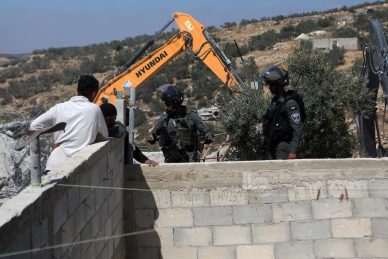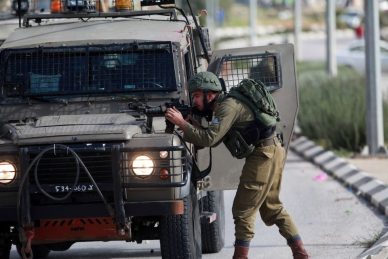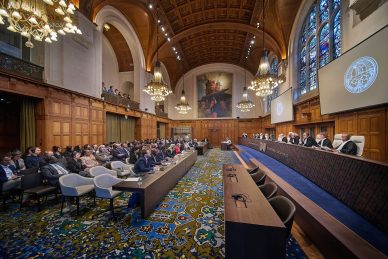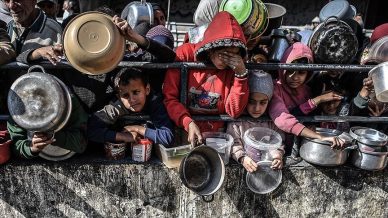The Israeli occupation authority (IOA) is responsible for the death of the famous UNRWA staffer Abdel Fattah al-Sibakhi 65 after banning him from crossing the Beit Hanoun checkpoint when he was still in the middle of his chemotherapy treatment for lung cancer.
He had been working for 30 years at UNRWA’s Procurement and Warehousing Unit in occupied Jerusalem until he was promoted to a director thus obtaining an almost permanent residency in Jerusalem and the West Bank.
Al-Sibakhi died a few days ago after being denied access to the Israeli-controlled Beit Hanoun crossing for chemical treatment and urgent medical tests under the pretext of security checks.
Permanent travel
The last thing that the al-Sibakhi family expected was that Abdel Fattah would not be able to reach the occupied city of Jerusalem where he spent 28 years working as an UNRWA staffer whom the occupation soldiers got familiar with while moving between Gaza and Jerusalem as a staff member of a humanitarian organization.
For a whole year Jamal al-Sibakhi accompanied his brother Abdel Fattah during his battle with cancer between Gaza and Jerusalem spending the last moments with him before he passed away watching him in Gaza unable to cross the Beit Hanoun crossing.
Jamal told the PIC “My brother was very generous and giving during his work with UNRWA and he served everyone. He retired years ago but UNRWA renewed his contract twice for his experience and dedication. Months ago he suffered from cancer.”
At the beginning Jamal was shocked by the news that Abdel Fattah had cancer; but he decided to accompany him on his treatment journey and traveled with him seven times to Jerusalem after many security rejections by Israel.
He added “After three months they gave us a permit to enter Jerusalem and have him treated there even though they knew of his work at UNRWA for 30 years. At some point he even rented an apartment in Jerusalem for one year and did not return to Gaza.”
The Israeli intelligence deliberately denied al-Sibakhi treatment at a critical stage when he was in bad need for the chemotherapy dose and some special drugs which could only be obtained in Jerusalem.
His illness lasted eight months and it got worse. UNRWA human rights institutions working in Israel and the Palestinian Authority tried to intervene to help the famous UNRWA staffer complete his treatment but the IOA rejected their requests.
He adds “His long record of employment with UNRWA didn’t help him. UNRWA was unable to intervene. We arrived at the crossing and the Israeli security interrogated him for 3-4 hours. He was subjected to a long routine questioning. He was unable to sit or talk but the interrogator insisted on exhausting him.”
During questioning al-Sibakhi was struggling with his pain and illness telling his interrogator (if I had to be held in custody why would you do that to me?). When he returned after he was denied entry he said to his family “Nothing will happen except by God’s will.”
IOA brutality
Mohammed al-Sibakhi the son of Abdel Fattah lived for 10 months in a state of constant concern for his father who got rejections nine times to travel for treatment and was able to cross the crossing seven times after a great deal of trouble.
Mohammed told the PIC “We lived with him a difficult experience and we felt the bitterness of the siege. When you find yourself unable to cross the Beit Hanoun crossing as well as the Rafah crossing you feel the cruelty of the siege.”
Mohammed used every single opportunity to contact Palestinian and Israeli human rights organizations to help his father cross the Beit Hanoun crossing but he always received a negative response from the Israeli intelligence saying that his father’s permit is under ‘security check’.
He was shocked by the brutality of the IOA which knows very well that his father was an UNRWA staff for a long time and that he crossed the Beit Hanoun crossing hundreds of times yet they deliberately let him die at an advanced stage of cancer.
Jawhar al-Sibakhi another brother of Abdel-Fattah described what happened to his brother as “deliberate murder” because the IOA knew all the details about his case and followed up his medical profile and denying him a permit was meant to deprive him his right to treatment when he was vulnerable the most.
“They knew him by heart he has been a permanent staffer in Jerusalem and the West Bank for many years but they killed him indirectly and their goal was only deliberate murder even though he had all the medical papers” he noted.
Abu Daoud Tamraz a neighbor of the al-Sibakhi keeps details of the humane touches and values al-Sibakhi had for many years with his commitment and care of all beings even animals.
“I have known him as a good neighbor to all his people and neighbors always giving charity to the poor during the day and at night he took care of stray animals.”
On the last day of his life he lost all his energy and was unable to eat but he recommended his children to maintain good relations with relatives and neighbors.














